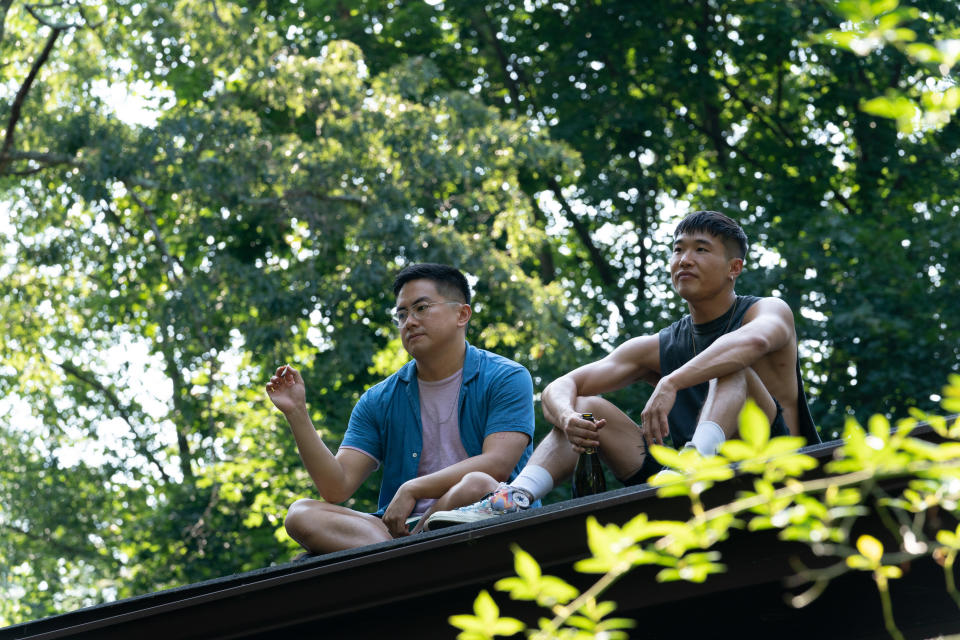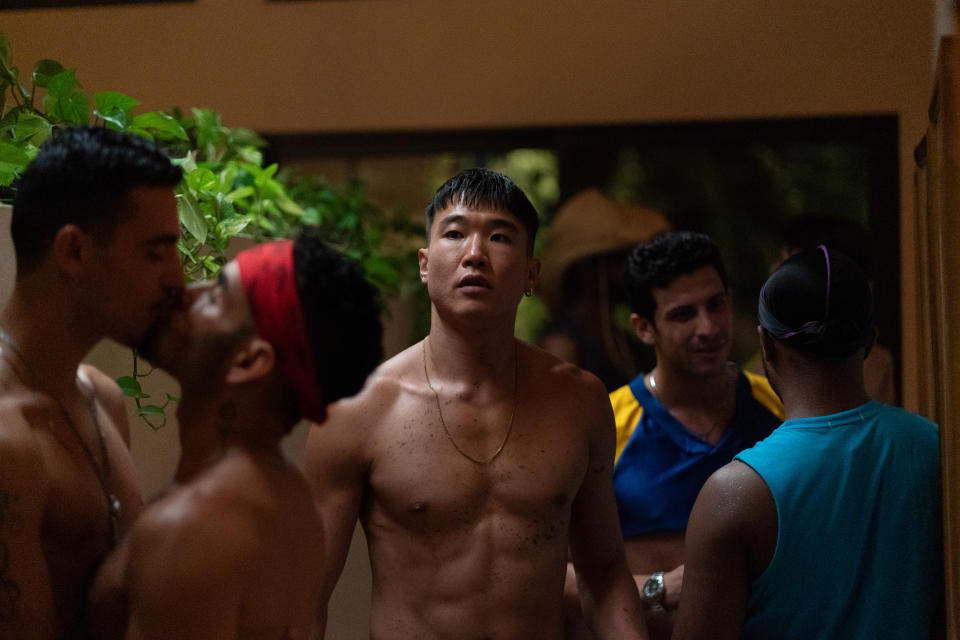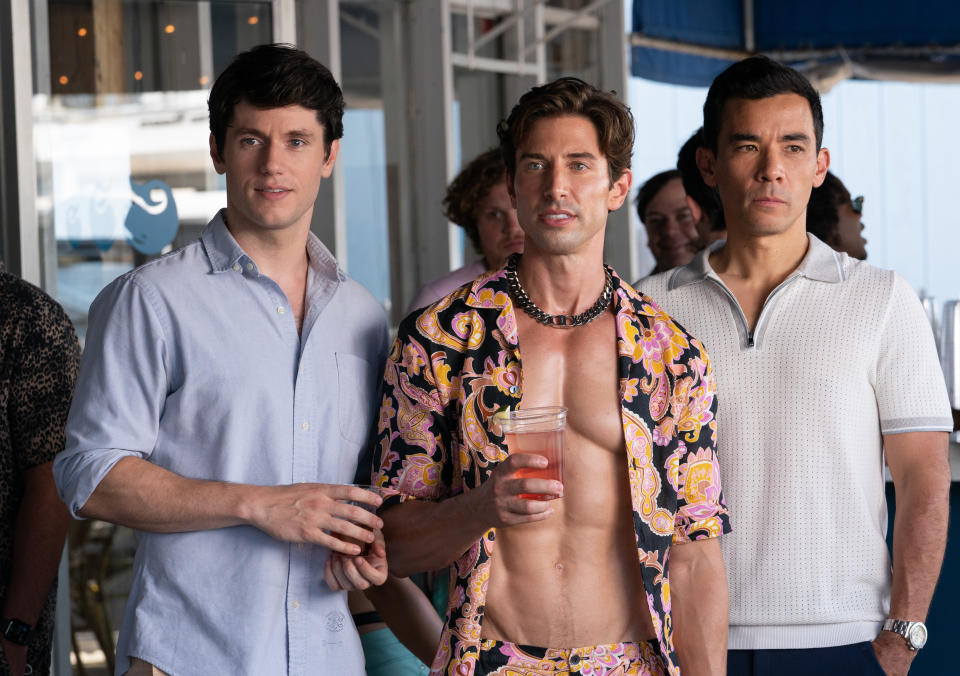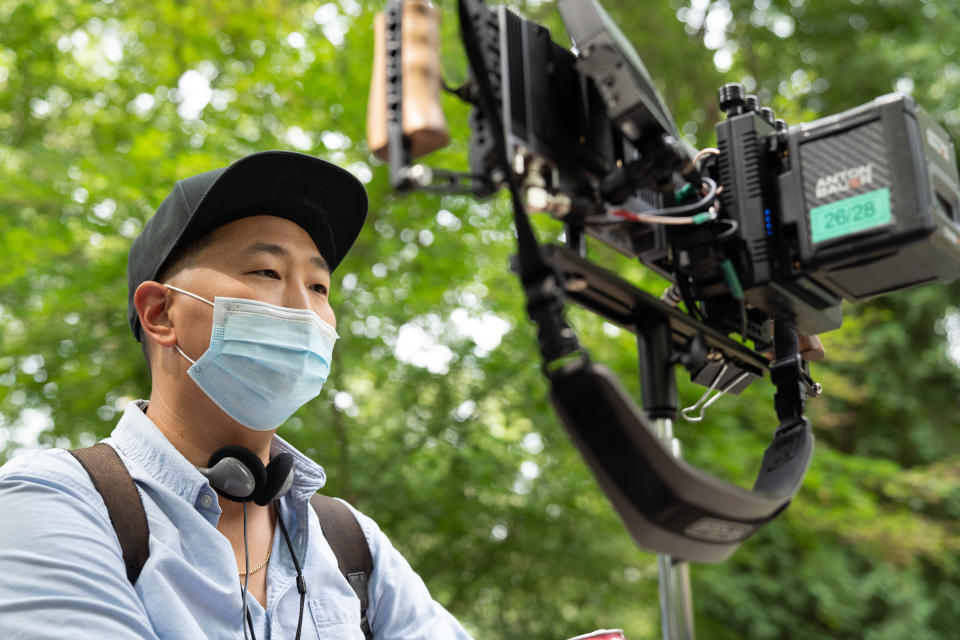‘Fire Island’: Meet the Power Trio Behind the Summer’s Sweetest, Funniest Gay Rom-Com

- Oops!Something went wrong.Please try again later.
- Oops!Something went wrong.Please try again later.
While queer comedians have been the hottest thing in stand-up for the last decade, it’s no secret that Hollywood is always the last one to get the joke.
As the likes of Kate McKinnon, Billy Eichner, and Bowen Yang ascended from New York’s musty improv theaters to the casts of “Saturday Night Live” and Disney remakes, the last decade has brought a remarkable shift in not only queer visibility but something far more substantial — queer influence. Queer TV shows like “The Other Two,” “Search Party,” and “Schitt’s Creek” reflect this sea change, but so far movies have been much slower on the uptake.
More from IndieWire
Terence Davies on the Cruelty of Gay Life and Why 'Benediction' Is His Best Film
'Fire Island' Review: The Gay Comedy Boom Bears Juicy Fruit in a Raucous Heartfelt Rom-Com
That all changes this year, with the release of two mainstream comedy movies from gay writers who also star in their projects. While Eichner’s major studio rom-com “Bros” is set to hit theaters in September, Joel Kim Booster’s “Fire Island” opens Pride month with a bang as it hits Hulu this month.
Set at New York’s famed gay vacation destination, “Fire Island” is a heartfelt and hilarious “Pride and Prejudice” riff, set to the tune of a queer friend group navigating the toxic landmines of gay male social hierarchy. Directed by indie filmmaker Andrew Ahn (“Spa Night,” “Driveways”) and starring real-life best friends Yang and Booster, it’s also a landmark Asian film arriving on the heels of box-office stunner “Everything Everywhere All at Once.”
A true ensemble piece, “Fire Island” also stars Margaret Cho, Conrad Ricamora, Matt Rogers, Tomas Matos, Torian Miller, James Scully, and Nick Adams, each wonderful in their own way. But the film is undoubtedly Booster’s baby, and with Yang’s star power and Ahn’s creative guidance, “Fire Island” marks a new era not only for Asian American film but also mainstream gay comedies.

Jeong Park
To kick off our Pride month coverage with a fabulous bang, IndieWire spoke to the “Fire Island” trifecta about making the summer’s hottest — and most heartfelt — comedy.
The Jane Austen Lightbulb
“If you want to get technical about it, it started in 2016 as a threat,” Booster said of the day the gay “Pride and Prejudice” idea visited him. Like all cultured gay children, Booster grew up watching the BBC miniseries with his mother, the perfect target demographic for a Colin Firth/Jennifer Ehle period romance. (He also loves Joe Wright’s 2005 version with Keira Knightley and Matthew Macfadyen.)
Hoping to look erudite to passing trade, Booster brought the Jane Austen novel as a beach read on his first trip to Fire Island. Revisiting Lizzie Bennett’s story for the first time as an adult, surrounded by a sea of gay New Yorkers peacocking down the beach, he imagined Austen as a prescient chronicler of contemporary gay culture.
“I was struck by how present and relevant her observations about class and the ways people communicate across class lines were,” he said. “Being in this heightened environment where there are no straight people to oppress us, where we have to figure out ways to oppress each other, and the various ways we do that. How we form those class structures socially around … whether it’s race, or abs, or actual class — money.”
“The perennial appeal of Jane Austen is these universal internal journeys people go through,” said Yang. “Even among those divisions, she’s still talking about this very closed system and what happens when people turn on each other within a somewhat limited scope. … That’s what Joel is trying to map onto it — what happens when gay men turn on each other, how do those things stratify?”

Jeong Park. Courtesy of Searchlight Pictures. © 2022 20th Century Studios All Rights Reserved
As Booster continued his Austen book club for one, so did the parallels. He wrote an essay for Penguin Random House, recently republished in honor of the film, subtitled “What Jane Austen Knew About Being a Gay Man in The 21st Century.” Not only is it very funny, it provides a delightful blueprint for a host of gay Jane Austen adaptations.
His literary agent urged him to adapt the essay into a script, which he resisted. (Booster: “It was never a serious idea. On paper it doesn’t feel like it should work. It feels very silly.”) Yang was attached from the start, and once he was cast on “SNL,” the project landed at Quibi, the now-defunct short-form streamer that gets a cutting cameo joke in the movie.
“It was always written as a vehicle for me and Bowen,” said Booster. “It’s very hard to get anything made, especially as a nobody in this industry. … As Bowen’s star rose, people got more and more interested in the idea of the movie. … His attachment really became paramount in getting it made.”
When Quibi went under, Booster and his team brought the idea to Jax Media film head John Hodges, a founder of A24 who cut his teeth on indie comedies like “Safety Not Guaranteed” and “Our Idiot Brother.” Shortly thereafter, Searchlight came on board after striking a streaming deal with Hulu, which had a hit in the 2020 lesbian holiday comedy “Happiest Season.”
“That movie was such a success for [Hulu], and I think that paved the way for proving there was an appetite for queer romance,” said Booster. “It was a right time, right place kind of thing.”
Pulling from Real Life
Friends from their early comedy days, Yang and Booster share a shorthand that translates into a loving naturalism onscreen. As the only Asian Americans in the friend group, their movie counterparts often share knowing looks and eye rolls, supporting each other with a sweet “E.T.”-style finger dance that says, “I got you, girl.”
“The finger touch is not necessarily something we do, but the number of times I’ve looked across the room at Bowen and communicated 10,000 different things about the way we’re feeling either out of place or uncomfortable or what-have-you is numerous,” said Booster. “That’s the secret, I think, to making it as subtle and not educational as it was, is that it all came from real places and real conversations.”
“It caught me off-guard, to be honest, and it didn’t really hit me until we were shooting those scenes where we sort of exposed that nerve for both of us,” said Yang of the more personal aspects of the script. “That was something I did not prepare for. And it felt like a lesson. It felt like something where I understood why the work is somewhat difficult and somewhat thorny.”
As the Jane to Booster’s Lizzie, Yang has the film’s grand love story. He also carries the emotional heft of the film, delivering an impressive dramatic performance that may surprise his “SNL” fans. In between their Ketamine jokes and shirtless flexing, the characters have real conversations about the dumpster fire of desirability politics in gay cruising culture, including body image, gender performance, and flagrant racism.

Jeong Park
“We never wanted to shy away from the judgmental white muscle gays,” said Ahn. “Joel has had many experiences on the island where he’s felt discriminated against and we had to acknowledge that. To make a Fire Island movie without that would feel like we were sanitizing the experience. So we really went for it.”
“So much of our entertainment is made wanting to erase,” said Booster. “I think there’s room for escapism and there’s room for fantasy. But there is stuff that comes up when you are Asian and you are dating a white guy. It was important to me to reflect the reality of what it is to be a gay man of color in the movie.”
The film addresses many overlapping issues without ever feeling didactic. Much like racism itself, it is both omnipresent and never blatantly spelled out in a gotcha moment.
“The perspective of this film is Joel’s perspective as a gay Asian American man on this island,” added Ahn. “I think that allowed us to really explore that experience and be able to talk about those themes of racism and classism without getting preachy or too obvious.”
Being vulnerable, together
Though it may be touted as such, “Fire Island” is by no means the first Asian American gay comedy. Ahn points to Alice Wu’s “Saving Face” and Ang Lee’s “The Wedding Banquet” as predecessors and influences. But they are few and far between, with a smaller potential audience than “Fire Island,” which will be available to stream all around the world.
The emotional toll of mining one’s personal life for public consumption is often overlooked in the battle for authentic storytelling. It’s a unique burden that underrepresented creators have to bear, and it can take a toll.
“It was sort of cathartic,” Yang said of the scene where he and Booster’s character lay out their insecurities. “I got emotional making the film around thinking I have grown past that time in my life where I felt deeply insecure. And then to have that be exhumed and dug up was a really rewarding challenge by the end.”
For someone so accustomed to playing ridiculously larger than life characters, often in extravagant comedic drag, such vulnerability was only possible with collaborators who shared his experiences.
“Andrew was very sensitive to that,” Yang said. “The fact that it was me, Joel, and Andrew finding it together made those other factors fall away. I was like, ‘OK, how do we, as a unit, mine this in the right way?’ Andrew really shaped this in the most perfect way. I can’t imagine this movie without another director.”
A perfect match
“Fire Island” is the rare comedy that is both uproariously funny and deeply moving, a nuanced balance that comes from Booster’s riotous script, Ahn’s cinematic chops, and the powerhouse comedic talent in the cast. As a gay Korean American filmmaker with two critically acclaimed indies to his name, Ahn was a natural choice in many ways.
“It was important to tell this story with another queer Asian man,” said Booster. “There are nuances that are so important and there was a shorthand with Andrew that made things so much easier than if I had done it with anyone else.”
Still, “Fire Island” is Ahn’s first comedy.

“‘Spa Night’ is not a laugh riot. It’s one of my favorite movies, but it is not a comedy by any means,” said Booster. “[But] Andrew understands the rhythm of comedy really well as a filmmaker. And half the battle was won in casting. He didn’t really have to worry too much about the comedy.”
“I relied a lot on our actors, they’re a hilarious cast,” Ahn said. “I tried to keep a really light hand. I was just trying to set the stage, create the environment for them to be able to have fun and sink into the scenes, ad-lib, improv. I just wanted to be able to capture their natural energy because I knew that would be funny. … At the end of the day, there is an emotional authenticity that I’m looking for in all of my work that always feels necessary.”
Ahn’s light touch gently guides the film through all of its thorny emotional territory, grounding the dazzlingly fun characters in the emotional throughline of these friendships between chosen family.
“I don’t think [a comedy director] would’ve been able to handle those dramatic moments with as much finesse,” said Booster. “I don’t think it would’ve been as balanced as it ends up being. This movie could have been extremely maudlin if not handled correctly. Andrew just brought the exact right balance to it.”
“Joel didn’t set out to have a gay Asian director and gay Asian leads,” said Yang. “This is just fortuitously how it worked out, and that’s something I will cherish. Hopefully that sets the tone for whatever I do going forward. But I also can cherish this for it being something of an anomaly, if it is that.”
“Fire Island” premieres on Hulu on Friday, June 3.
Best of IndieWire
10 LGBTQ Film and TV Creators on the Rise, from Jerrod Carmichael to Isabel Sandoval
A History of Unsimulated Sex Scenes in Cannes Films, from 'Mektoub' to 'Antichrist'
20 Controversial Film and TV Book Adaptations That Rankled Their Audiences and Authors
Sign up for Indiewire's Newsletter. For the latest news, follow us on Facebook, Twitter, and Instagram.

